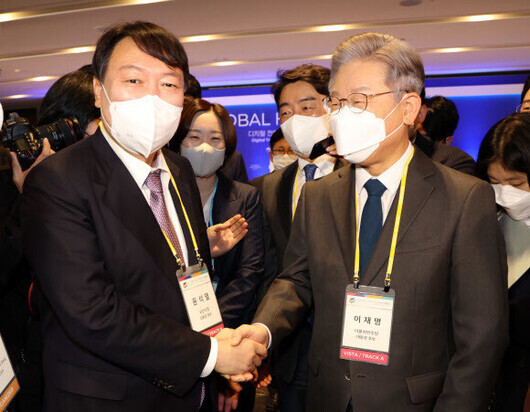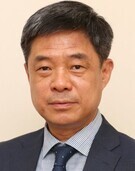hankyoreh
Links to other country sites 다른 나라 사이트 링크
[Column] Getting to the root of the odd 2022 election matchup


By Back Ki-chul, executive editor
“The Moon Jae-in administration’s biggest blunder has been to resurrect the People Power Party and turn Yoon Seok-youl into the top opposition party’s presidential candidate,” Justice Party presidential candidate Sim Sang-jung recently said.
Her words offer a lot of food for thought. How should we regard the current situation, where an administration’s prosecutor general has become the primary opposition party’s candidate and is now going after that administration’s very lifeline? Where did things go wrong?
The clock is ticking faster with the nearing election, which has solidified into a race between Democratic Party candidate Lee Jae-myung and People Power Party (PPP) candidate Yoon. Both sides have plenty of issues that are about to become fodder in the election battle, including various allegations and policy controversies.
But rather than simply getting caught up in that storm, we should be looking closely to find the roots of the current situation.
Those in the Democratic Party may take issue with an examination of the causes behind how the election has played out so far. They may attribute it all to Yoon’s long-cherished ambitions and will to power.
But it takes more than will for things to turn out the way they have. The problems have been compounded by misguided decisions coming from the heart of the administration. The dalliances of former Deputy Prime Minister for the Economy Kim Dong-yeon and former Board of Audit and Inspection Chairperson Choe Jae-hyeong can’t be blamed on their “political ambitions” alone.
So who is at fault here?
It goes without saying that President Moon Jae-in bears a large share of the blame. His appointment choices have been a disaster. He can’t just shift the blame onto others, shrugging that he had no idea they would actually do what they’ve done.
When the whole Cho Kuk/Yoon Seok-youl commotion was going on, neither of the two was actually in the right. Cho clearly bore responsibility for exemplifying the moral hazard of the so-called “586 generation” — people in their 50s who went to school in the ’80s and were born in the ’60s.
But Yoon was equally wrong in offering himself as a living example of the longstanding vices the prosecution service has been rife with. This is backed up by administrative court rulings that have found both the judicial decision in a case involving Cho’s family members and the disciplinary action imposed against Yoon to have been lawful.
Lee Jae-myung’s strength as a candidate is that he is relatively free from all this baggage. That’s what helped make him a candidate, and for a time it looked like the former Gyeonggi Province governor had a good chance thanks to his record as the head of a local government.
But with a combination of a strong push to vote the Democratic Party out of office and the allegations surrounding development in Seongnam’s Daejang neighborhood, polls show him either neck-and-neck with or trailing Yoon.
The reason I’m giving this kind of blow-by-blow explanation when everyone already knows the story behind how the election got to where it is, is because Democratic Party people tend to ignore it. Instead, they insist that it’s enough to simply charge ahead.
What once was a favorable climate in the wake of a landslide general election win has turned into the bizarre presidential election situation we now see — the result of appointment failures and double standards, arrogance and self-righteousness, with the real estate situation only fueling the fire.
We don’t have to go back very far to see how things played out very similarly with the April by-election for mayor of Seoul.
There, a complacent attitude resulted in a spiritless defeat. That was another example of “charging ahead,” while ignoring the sexual harassment allegations against late former Seoul Mayor Park Won-soon. Instead of sincere repentance, the party’s “reflection” was half-hearted at best.
At the time, it wouldn’t have been a realistic option for the Democratic Party to simply not put forward a candidate for Seoul mayor. In retrospect, however, it would have been wiser to come to some kind of verdict.
No matter how good your policies and capabilities are, there’s little you can do when the base you stand upon is deteriorating. Without some serious reflection, repentance and reforms for all the double standards and misgovernment, getting another progressive administration elected may be a distant dream. Without reforms, it will be difficult for the Democratic Party to even look the 20- and 30-something voters they’ve lost in the eye.
Some way or another, the party will need to reflect on and apologize for these issues they’ve faced to date.
Some will say that it’s already done too much apologizing and reflecting. After all, the reason Japan has yet to be forgiven is that it won’t reflect and apologize to a point that is acceptable to the other side, namely the victims. No matter how much you apologize, it isn’t a real apology or reflection if the other side doesn’t accept it.
First, Moon Jae-in needs to show a humble attitude as president.
He simply has to do more of what he did in his last National Assembly administrative policy speech: noting both the things that have been handled well and those that have been handled poorly. He will need to bow his head before the public over his questionable appointments and the confusion surrounding prosecutorial reforms.
The people who held key administration positions will also need to behave with more humility. They should apologize and reflect until the public understands.
Second, Lee Jae-myung will need to dispel the apprehensions and dissatisfaction that the public holds toward people in the Democratic Party. He should provide a glimpse at the personnel reforms to come by making public what his Cabinet or advisory group might look like if he is elected. He must allay the public’s fears that the same crew of people will dominate positions of power or that the same interest groups will run rampant if the Democratic Party remains in power.
Third, Lee needs to clearly indicate what policies he intends to carry on from this administration and what he plans to do differently. It’s tough to make any new program without reflection on past failures. The party needs to keep what’s worth keeping, but it also needs a clear new direction for policies related to real estate and alleviating polarization.
Fourth, he must show a clear commitment to unity with non-mainstream figures like Sim Sang-jung. This isn’t about simply backing a single horse or setting up a policy coalition — it must become an occasion for reflecting on the Democratic Party administration’s missteps and making a change.
This kind of solidarity needs to be a step toward true reflection, not a matter of election engineering.
Please direct questions or comments to [english@hani.co.kr]

Editorial・opinion
![[Column] Season 2 of special prosecutor probe may be coming to Korea soon [Column] Season 2 of special prosecutor probe may be coming to Korea soon](https://flexible.img.hani.co.kr/flexible/normal/500/300/imgdb/original/2024/0426/3317141030699447.jpg) [Column] Season 2 of special prosecutor probe may be coming to Korea soon
[Column] Season 2 of special prosecutor probe may be coming to Korea soon![[Column] Park Geun-hye déjà vu in Yoon Suk-yeol [Column] Park Geun-hye déjà vu in Yoon Suk-yeol](https://flexible.img.hani.co.kr/flexible/normal/500/300/imgdb/original/2024/0424/651713945113788.jpg) [Column] Park Geun-hye déjà vu in Yoon Suk-yeol
[Column] Park Geun-hye déjà vu in Yoon Suk-yeol- [Editorial] New weight of N. Korea’s nuclear threats makes dialogue all the more urgent
- [Guest essay] The real reason Korea’s new right wants to dub Rhee a founding father
- [Column] ‘Choson’: Is it time we start referring to N. Korea in its own terms?
- [Editorial] Japan’s rewriting of history with Korea has gone too far
- [Column] The president’s questionable capacity for dialogue
- [Column] Are chaebol firms just pizza pies for families to divvy up as they please?
- [Column] Has Korea, too, crossed the Rubicon on China?
- [Correspondent’s column] In Japan’s alliance with US, echoes of its past alliances with UK
Most viewed articles
- 1Is Japan about to snatch control of Line messenger from Korea’s Naver?
- 2‘We must say no’: Seoul defense chief on Korean, USFK involvement in hypothetical Taiwan crisis
- 3[News analysis] Using lure of fame, K-entertainment agency bigwigs sexually prey on young trainees
- 4Will NewJeans end up collateral damage in internal feud at K-pop juggernaut Hybe?
- 5‘Weddingflation’ breaks the bank for Korean couples-to-be
- 6Division commander ordered troops to enter raging flood waters before Marine died, survivor says
- 7No good, very bad game for Korea puts it out of Olympics for first time since 1988
- 8“Korea is so screwed!”: The statistic making foreign scholars’ heads spin
- 9The dream K-drama boyfriend stealing hearts and screens in Japan
- 10[Column] The clock is ticking for Korea’s first lady